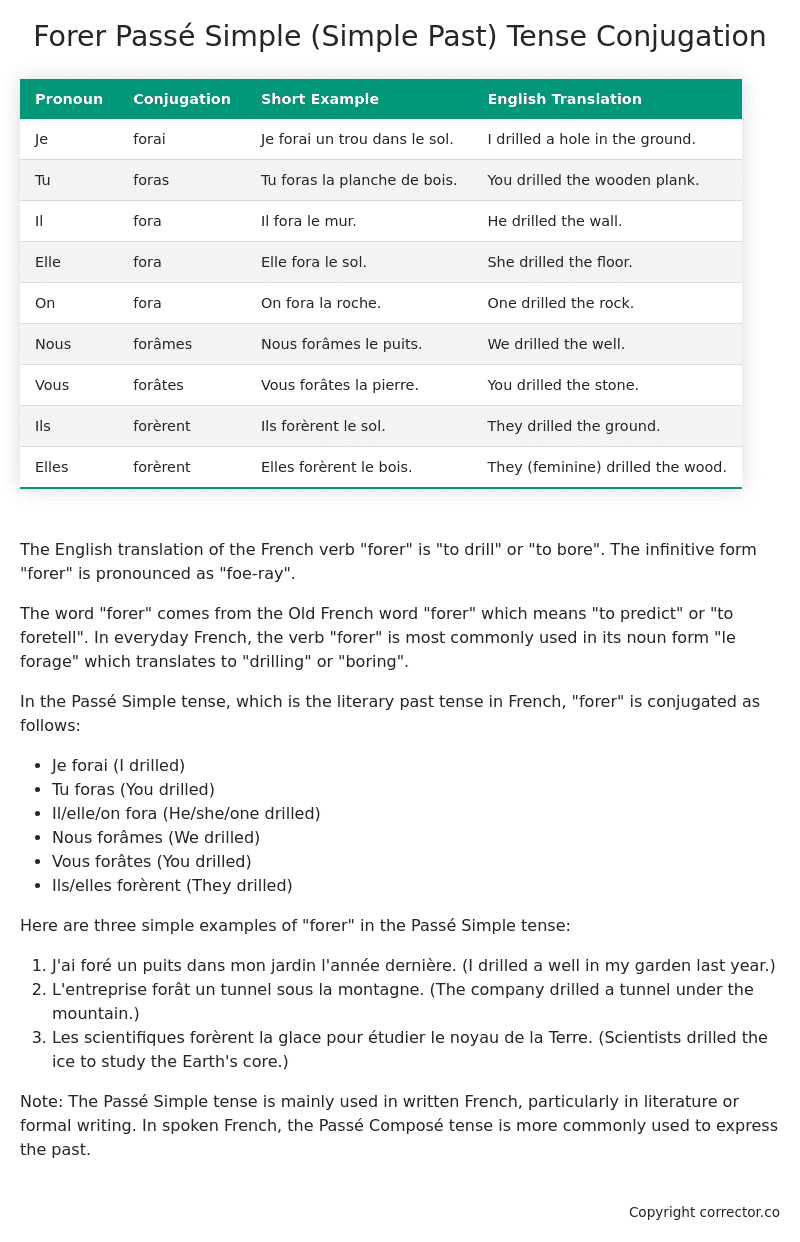Passé Simple (Simple Past) Tense Conjugation of the French Verb forer
Introduction to the verb forer
The English translation of the French verb “forer” is “to drill” or “to bore”. The infinitive form “forer” is pronounced as “foe-ray”.
The word “forer” comes from the Old French word “forer” which means “to predict” or “to foretell”. In everyday French, the verb “forer” is most commonly used in its noun form “le forage” which translates to “drilling” or “boring”.
In the Passé Simple tense, which is the literary past tense in French, “forer” is conjugated as follows:
- Je forai (I drilled)
- Tu foras (You drilled)
- Il/elle/on fora (He/she/one drilled)
- Nous forâmes (We drilled)
- Vous forâtes (You drilled)
- Ils/elles forèrent (They drilled)
Here are three simple examples of “forer” in the Passé Simple tense:
- J’ai foré un puits dans mon jardin l’année dernière. (I drilled a well in my garden last year.)
- L’entreprise forât un tunnel sous la montagne. (The company drilled a tunnel under the mountain.)
- Les scientifiques forèrent la glace pour étudier le noyau de la Terre. (Scientists drilled the ice to study the Earth’s core.)
Note: The Passé Simple tense is mainly used in written French, particularly in literature or formal writing. In spoken French, the Passé Composé tense is more commonly used to express the past.
Table of the Passé Simple (Simple Past) Tense Conjugation of forer
| Pronoun | Conjugation | Short Example | English Translation |
|---|---|---|---|
| Je | forai | Je forai un trou dans le sol. | I drilled a hole in the ground. |
| Tu | foras | Tu foras la planche de bois. | You drilled the wooden plank. |
| Il | fora | Il fora le mur. | He drilled the wall. |
| Elle | fora | Elle fora le sol. | She drilled the floor. |
| On | fora | On fora la roche. | One drilled the rock. |
| Nous | forâmes | Nous forâmes le puits. | We drilled the well. |
| Vous | forâtes | Vous forâtes la pierre. | You drilled the stone. |
| Ils | forèrent | Ils forèrent le sol. | They drilled the ground. |
| Elles | forèrent | Elles forèrent le bois. | They (feminine) drilled the wood. |
Other Conjugations for Forer.
Le Present (Present Tense) Conjugation of the French Verb forer
Imparfait (Imperfect) Tense Conjugation of the French Verb forer
Passé Simple (Simple Past) Tense Conjugation of the French Verb forer (You’re reading it right now!)
Passé Composé (Present Perfect) Tense Conjugation of the French Verb forer
Futur Simple (Simple Future) Tense Conjugation of the French Verb forer
Futur Proche (Near Future) Tense Conjugation of the French Verb forer
Plus-que-parfait (Pluperfect) Tense Conjugation of the French Verb forer
Passé Antérieur (Past Anterior) Tense Conjugation of the French Verb forer
Futur Antérieur (Future Anterior) Tense Conjugation of the French Verb forer
Subjonctif Présent (Subjunctive Present) Tense Conjugation of the French Verb forer
Subjonctif Passé (Subjunctive Past) Tense Conjugation of the French Verb forer
Subjonctif Imparfait (Subjunctive Imperfect) Tense Conjugation of the French Verb forer
Subjonctif Plus-que-parfait (Subjunctive Pluperfect) Tense Conjugation of the French Verb forer
Conditionnel Présent (Conditional Present) Tense Conjugation of the French Verb forer
Conditionnel Passé (Conditional Past) Tense Conjugation of the French Verb forer
Conditionnel Passé II (Conditional Past II) Tense Conjugation of the French Verb forer
L’impératif Présent (Imperative Present) Tense Conjugation of the French Verb forer
L’impératif Passé (Imperative Past) Tense Conjugation of the French Verb forer
L’infinitif Présent (Infinitive Present) Tense Conjugation of the French Verb forer
L’infinitif Passé (Infinitive Past) Tense Conjugation of the French Verb forer
Le Participe Présent (Present Participle) Tense Conjugation of the French Verb forer
Le Participe Passé (Past Participle) Tense Conjugation of the French Verb forer
Struggling with French verbs or the language in general? Why not use our free French Grammar Checker – no registration required!
Get a FREE Download Study Sheet of this Conjugation 🔥
Simply right click the image below, click “save image” and get your free reference for the forer Passé Simple tense conjugation!

Forer – About the French Passé Simple (Simple Past) Tense
Formation
Usage
Narration
Historical Context
Interactions with other tenses
Passé Composé
Imparfait
Conditional and Subjunctive
Summary
I hope you enjoyed this article on the verb forer. Still in a learning mood? Check out another TOTALLY random French verb conjugation!


